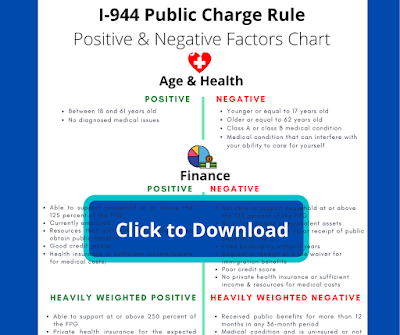Table of Content
- How does USCIS evaluate my case for public charge?
- Step 1: Evaluate and categorize into positive, negative or interrelated
- Step 2: Weigh all factors
- Step 3: Final Decision
- What are the Positive Factors for Public Charge Rule?
- What are the Negative Factors for Public Charge Rule?
- What if I am just a stay-home mom?
- What Positive Factors Weighs Heavier?
- What Negative Factors Weighs Heavier?
How does USCIS evaluate my case for public charge?
Basically, the reviewers are required to take three steps to evaluate whether an applicant is subject to a public charge or not.
Step 1: Evaluate and Categorize into Positive, Negative, or Interrelated
They will evaluate all facts, circumstances, and evidence in the record and categorize all factors into positive, negative or interrelated.
What factor is positive and what's negative? It depends on yours likelihood of receiving any public benefits in the next 12 to 36 months.
- Positive factors: facts and evidence that will decrease your chance of using public benefits
- Negative factors: facts and evidence that will increase your chance of using public benefits
Remember, the test is in aggregate, which means whether you use 2 separate benefits simultaneously for 6 months or 3 separate benefits for 4 consecutive months, both will be counted as 12 months (one year) of total benefit use.
What are the Positive Factors for Public Charge Rule?
- Age: between 18 to 61
- Health: no diagnosed medical condition
- Finance:
- Household income is higher than 125% of poverty line. Learn more about I-944 income requirements here.
- Currently employed
- Other resources that will make you ineligible for public benefits
- Assets & resources
- Good credit scores - See here for more information about credit reports.
- Health insurance
- Education & Skills:
- Attended elementary, middle, and/or high school
- Higher education such as Bachelor's Degree, Master's Degree, and/or Doctoral Degree
- Professional skills and relevant certificates
- English proficiency
- Other language skills
- Evidence of ineligibility for public benefits such as immigration status, or expected period of stay
- Your sponsor(s) are your family members
- Primary caregiver *
What if I am just a Stay-home Mom?
*I want to elaborate this factor a little more. Some of my readers are full-time moms and they don't have any work history. Note that being a primary caregiver of your kids is actually a positive factor! There are generally two groups of people in this category will be considered as a positive factor:
- A stay-home parent who care for a newborn or young children in school.
- A caregiver who cares for his or her elderly, ill, or disabled family members.
However, it's important to know that USCIS also takes a lot of things into consideration such as
- How old are the people/kids you take care of?
- Do they live with you in the same residency?
- Are they part of your household?
- Are you the only caregiver to them?
Remember to provide supporting evidence such as
- Medical record and reports
- Your legal relationship with the person you take care of.
- Your kids' birth certificates (proof of age & relationship)
What are the Negative Factors for Public Charge Rule?
- Age 17 and younger or age 62 and older
- Health: I-693 medical report lists
- Class A medical condition
- Class B medical condition
- Doctor indicates the health condition can interfere with the applicant's ability to care for him or herself (ex: to school or work)
- Finance:
- Household income is lower than 125% of poverty line. Learn more about I-944 income requirements here.
- You have zero or low income or equivalent assets
- Request, certification of, or receipt of public benefits in the US
- Bankruptcy in the last two years
- Request or receipt of a fee wavier for immigration benefits
- Poor credit score & report - See here for more information about credit reports.
- No Health Insurance
- Education & Skills:
- No high school diploma, GED, or equalivant
- No work history
- No occupational skills
- Don't speak English
Step 2: Weigh all factors
Now they will weigh all factors individually and cumulatively. One factor can be more heavily weighted (more important) than others.
What Positive Factors Weigh Heavier?
- Your household assets, income, and resources are above 250% of the poverty guideline
- Private health insurance for the expected period of admission
- You are not receiving benefits under Affordable Care Act (ACA, also known as Obamacare)
- You have a work permit and are currently employed with an annual income above 250% of the poverty guideline
What Negative Factors Weigh Heavier?
- You received public benefits for more than 12 months in any 36 month period before the application for your green card
***Alert: USCIS no longer consider public benefit condition during COVID-19. (As long as the court order is in effect. This might change later on, check back again!) Learn more here.
- You have a medical condition and are not insured or able to pay for the possible medical costs
- You are not a full-time student and are authorized to work but you don't have recent employment history
- You have previously been found inadmissible or deportable on the public charge ground
Step 3: Final Decision
Finally, they will determine whether this applicant is likely or not likely to become a public charge at any time in the future.
- Not inadmissible: Positive factors outweigh the negative factors - You passed!
- Inadmissible: Negative factors outweigh the positive factors - You didn't pass.
Read to learn more:


No comments:
Post a Comment
Thank you for leaving me a comment! I will review it shortly:) You can also contact me at chenevy99@gmail.com